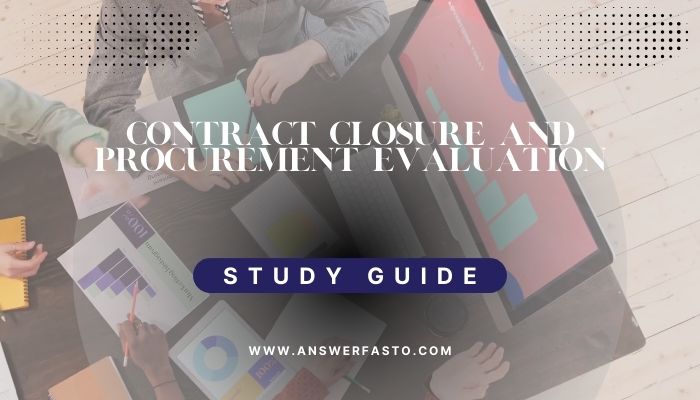Close Contracts
1.Contract Evaluation
Initially, it is necessary to study all the terms and conditions of the contract to ensure that all the requirements for closing are fulfilled.
Example: The project manager checks the specifications of the contract with respect to the entire workin a construction project.
2. Performance Assessment
Examine the performance of the supplier or vendor based on the quality, the time of delivery, and whether each of them has conformed to the definitions in the contract.
Example: For IT outsourcing, the quality of the software delivered, its timeliness, and other SLAs are measured.
3. Inspection and Acceptance
Check whether all goods or services fulfill the agreed criteria of inspection or quality before being accepted as final.
Example: In manufacturing projects, the product is quality controlled to inspect its quality against set standards.
4.Closure Documentation
Document the closing process of the contract, which includes all dispute resolutions and resolved outstanding issues to maintain a transparent historical record.
Example: In a consulting engagement, such a closure document would state the number of objectives achieved, state the remaining invoices, and make recommendations.
5. Settlement of Outstanding Payments
Final settlement of all financial obligations such as vendor payments would also take place by the terms of the contract. Example: The last payment is made to the advertising agency at the closing of a marketing campaign after the provision of the services.
6. Formal Acceptance:
Receive formal acceptance or sign-off from all parties regarding deliverables as meeting contract requirements. Example: In software development, both the client and the team sign for acceptance of compliance with all agreed terms.
7. Release Resources:
Deallocate all resources that were, at any time, committed to the project, whether personnel, equipment, or facilities. Example: in construction, returning the equipment after the contract closure to rental firms.
8. Lessons Learned:
Hold a debriefing session for a review of insights and gaps in procurement and contract management. Example: Lessons learned from a project for procurement of office supplies provide avenues for improvement in resulting vendor communications.
Procurement Evaluation Process
1. Performance Assessment
Determine vendor performance using predetermined key performance indicators (KPIs) to ensure alignment with objectives.
Example: In software development, KPIs include defect rates and adherence to timelines.
2. Quality Review
The quality of goods or services delivered must be assessed to ensure it meets the required standards.
Example: An audit is conducted by a manufacturing project to verify the compliance of products.
3. Timeliness and Contract Adherence
Focus on whether the vendor was met with timeframes and phrase terms set in the contract.
Example: For construction, the evaluation is whether the vendor is completing phases on time and with in budget.
4. Cost Performance
Compare actual costs against budgeted figures in assessing financial efficiency.
Example: By this evaluate the consulting project whether the vendor kept to the approved budget.
5. Communication and Collaboration
The vendor’s interaction with the project can be explored to see how they responded and addressed most things.
Example: In a marketing campaign, there is an assessment of the vendor’s collaboration as effective as how it absorbs customer feedback.
6. Collecting Feedback
Solicit feedback from team members, stakeholders, and end-users to capture the various perceptions about how the vendor has performed.
E.g.: In an IT project, feedback will come from end-users on how easy software is for them to use and the functionalities available.
7. Conclusive Evaluation Report
A report documenting the results of the evaluation on how the vendor performed and how they are expected to improve in the future.
E.g. For the construction project report, vendor performance is highlighted in terms of safety, quality, and timelines.
Detailed Examples
1. Finalization of Construction Contracts
Post-construction, the site manager carries out the inspections to ensure quality standards are met, the final payment is disbursed, and with a signed acceptance document, the project closure is declared.
2. IT Procurement Assessment
The organization, IT, assesses the vendor performance of the software in question regarding quality, business alignment, and responsiveness. Based on these assessments, recommendations are made in the report against future procurement.
3. This is a Marketing Agency Completion
At the end of a campaign, there will be discussions about performance versus objectives internally between the client and agency. The last pay invoice is paid once satisfaction has been reached and the contract is complete.
4. Manufacturing Vendor Assessment
There is a review of vendor performance in terms of product quality, adherence to schedules, and cost containment. It indicates the need to strengthen communication in supply chain management.
5. Completion of Consulting Services
Following the delivery of the consulting services, lessons learned capture what went well and areas for improvement. These will feed into a final report to further enhance future engagements.
Summary
Contract closure and procurement evaluation activities are critical for assuring that contracts are properly completed and are to be used for holistic assessment of vendor performance. Such processes do not only give merit to best practices in project management, but they also provide insight for optimizing future procurement strategies for continuous improvement purposes.



